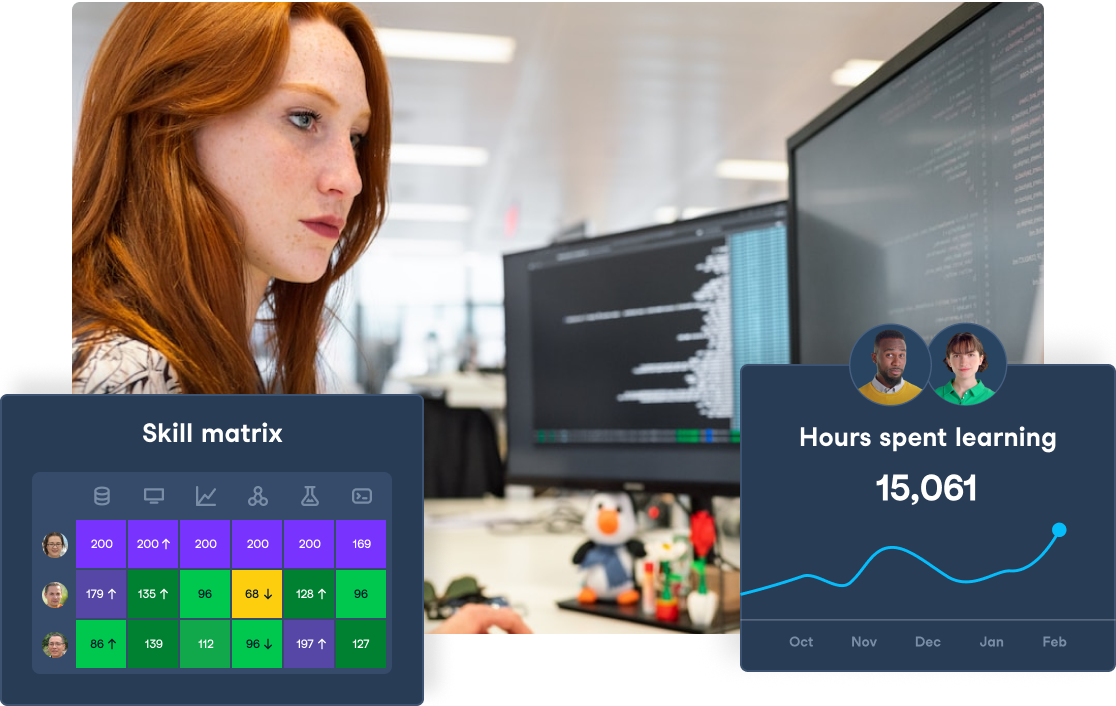According to a recent survey we conducted, 81% of companies are focused on implementing process redesign and culture change to build data fluency. But that’s easier said than done.
For many companies, especially larger enterprises, there are a lot of moving parts—common challenges include legacy platforms, cumbersome internal processes, a culture that’s resistant to change, and a workforce that doesn’t have the right skills. These companies may benefit from modernization initiatives to guide their data transformation.
“The best practice my company has done is define their vision and set up a committee to oversee this transformation.”—Director, Manufacturing Industry
Let’s take a look at how one of our customers, a global insurance provider, has benefited from establishing a modernization committee and a learning support group for actuarial science. You can also check out how to build your organization’s data & AI maturity in our separate webinar.
Training 2 or more people? Check out our Business solutions
Get your team access to the full DataCamp library, with centralized reporting, assignments, projects and more

Establishing an Actuarial Science Modernization Committee
Actuaries analyze financial risk for insurance companies, and in many countries like the US, they must pass a series of rigorous professional exams, just as lawyers and doctors do. In their day-to-day jobs, they use math and statistics to assess risk in insurance and finance.
The actuarial science industry is quite mature in its use of data science—but that doesn’t mean every insurance company is fully data-fluent. Many companies want to innovate and implement state-of-the-art initiatives in AI and machine learning but are still in the early stages of business application.
“Insurance is one of the most regulated industries, and just keeping your lights on takes a lot of effort. A lot of actuaries rarely have time to think about the future.” —Manager of Actuarial Modernization
Although our client has long been a domain expert in insurance, they recognize the need to keep up with industry-leading trends like automation and AI for pricing. So they created an actuarial modernization committee to enable actuaries to leverage tools and technology to work at their full capacity.
The committee supports all actuaries at the company to help them build a broad base of data skills. It currently has about 30 members, a mix of experienced employees and new hires. Their focus is on scaling business expertise by driving data and technology initiatives, particularly Python, which is a general-purpose language capable of solving almost any programming challenge.
Learning By Doing With DataCamp
The committee works with a cross-functional learning support group to train employees in Python via DataCamp. They’re finding DataCamp’s learn-by-doing methodology useful for practical application of concepts. In July, the learning support group established a new structure where members complete selected DataCamp courses in three-to-four-week sprints and meet weekly to practice and share knowledge.
Since May, 33 individual learners have spent almost 800 hours on the platform, completed more than 10,000 practice exercises, and completed 53% of courses started, which is a high completion rate for an online learning platform. They’ve learned skills like data manipulation and visualization with Python, working with real-world datasets containing both string and numeric data, including time-series data. Many learners are also leveraging DataCamp’s R courses to prepare for the actuarial science predictive analytics exam.
To keep up with constant changes in data and technology, companies must have a culture that values continuous learning. Forward-thinking companies aren’t just hiring data talent—they’re fostering a company culture that keeps employees excited to learn. And investing in a culture of continuous learning creates a virtuous cycle because these are the companies that are attracting and retaining top talent.
You can follow our client’s example and adopt initiatives to modernize your company with data science and analytics with DataCamp. Let us help. Find out how at datacamp.com/business or schedule a demo of our platform.
Training 2 or more people? Check out our Business solutions
Get your team access to the full DataCamp library, with centralized reporting, assignments, projects and more
